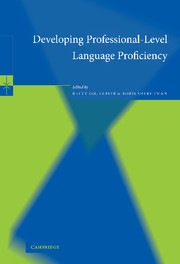Book contents
- Frontmatter
- Contents
- Notes on contributors
- Foreword
- Acknowledgments
- I Principles, practices, and theory
- 1 Principles and practices in teaching Superior-level language skills: not just more of the same
- 2 Toward academic-level foreign language abilities: reconsidering foundational assumptions, expanding pedagogical options
- II Programs
- III Learners and users
- References
- Index
1 - Principles and practices in teaching Superior-level language skills: not just more of the same
Published online by Cambridge University Press: 03 December 2009
- Frontmatter
- Contents
- Notes on contributors
- Foreword
- Acknowledgments
- I Principles, practices, and theory
- 1 Principles and practices in teaching Superior-level language skills: not just more of the same
- 2 Toward academic-level foreign language abilities: reconsidering foundational assumptions, expanding pedagogical options
- II Programs
- III Learners and users
- References
- Index
Summary
Historically, few students achieve Superior and Distinguished levels of proficiency in any foreign language. In fact, relatively few courses even propose to bring students to the Superior level, at which students can expect to use the language professionally while having obviously less than native control of linguistic and cultural elements, let alone the Distinguished level, at which students begin to approach the level of an educated native speaker.(These levels are called Level 3 and Level 4, respectively, on the 5-level US government scale, which is presented later in this chapter.) For many years, there has been a tacit assumption among foreign language educators and administrators that language programs cannot be expected to bring students any further in the classroom than the Advanced High level. Consequently, few teachers have much experience in teaching students at the Superior level, yet there is a growing awareness of the need to do so. This book focuses on just that part of the language-teaching spectrum: successfully assisting Superior-level students to reach the Distinguished level. Its goal is to provide theory and successful models for teachers who find themselves faced with this task.
The direction from which we have come
In analyzing how best to teach students at the Superior level, it may be helpful to look at teaching practices in general. Specifically, what are the underlying philosophies of today's foreign language education (FLED), what are the theories of second language acquisition (SLA), what has research shown us about language learning, and what are the methods that guide our instruction – and how do these assumptions, ideas, knowledge, and practices influence the teaching of students at Superior levels of proficiency?
- Type
- Chapter
- Information
- Developing Professional-Level Language Proficiency , pp. 3 - 33Publisher: Cambridge University PressPrint publication year: 2002
- 10
- Cited by



